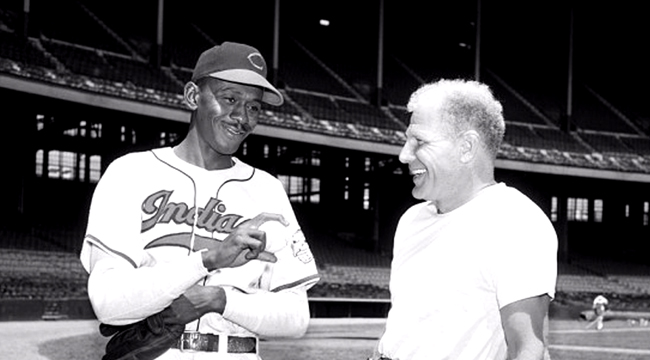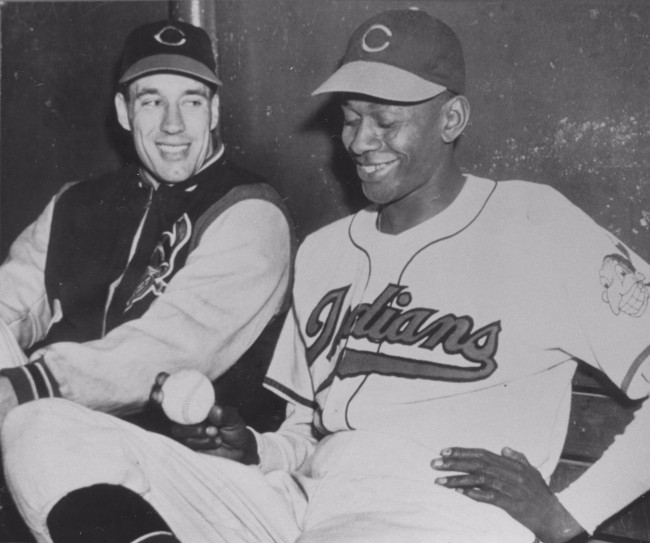
It was only by a strange fluke of history that the first black pitcher to throw in a World Series was 41-ish-year-old Satchel Paige.
Paige was the second black pitcher to make the majors, at the tail end of a whirlwind career that crisscrossed the country and turned him into a folkways legend. (The first was Dan Bankhead, who had a disappointing 1947 season playing with Jackie Robinson’s Brooklyn Dodgers and advanced to the World Series, though he didn’t pitch. After working his way back to the show two years later, he flamed out hard and spent the remainder of his career pitching in Mexico.) The team who signed him, the Cleveland Indians, owned and operated by all-around weirdo Bill Veeck, reached the Series in 1948 behind good years from fellow Negro League veteran Larry Doby, Joe Gordon, and an amazing season from Lou Boudreau, who alone topped 10 wins above replacement, with Paige along for the ride.
To be clear, Paige was no superstar. He was an MLB rookie in his early 40s who was largely relegated to bullpen work with only a few stars mixed in. But after the Braves thrashed three consecutive Indians pitchers, Paige came in with his team facing a 10-5 hole in the top of the seventh of game five. With one out, the immaculately named Braves infielder Eddie Stanky was on first, with outfielder Mike McCormick on third.
Paige’s first batter was not a batter at all but legendary southpaw Warren Spahn, who lifted a fly ball to center field that scored McCormick.
Then Paige squared off against outfielder Tommy Holmes. With the count sitting at 1-0, Paige balked. This was fairly common for him, as he was known to incorporate hesitation moves and other such oddball trickery into his pitching routine and always toed the line between legit trickeration and balky malfeasance. Stanky advanced to second, but it proved irrelevant once Paige induced a grounder to short that was scooped by Boudreau and thrown to first for an easy out. Al Rosen then pinch-hit for Paige to start off the bottom of the seventh.
A pitcher flyout, a balk, and a line out. That is the complete Major League World Series career of one of the greatest pitchers who ever lived. Two batters.
That’s extremely goofy and also super-depressing all at once, right? This is a metaphor.
https://www.youtube.com/watch?v=LyjLJ96iFBM?rel=0
Veeck insisted that he didn’t sign Paige to his Indians squad as a stunt, even though he was immensely fond of doing such things during his lengthy career as a team owner and general manager. In his book, Veeck as in Wreck, amidst a compendium of truths, halved and wholed, he describes seeing Paige report to the team for the first time on July 5, 1948 and throw 20 pitches to Boudreau. Nineteen of them were strikes, the batter helpless to make any convincing contact. Veeck quotes Boudreau after this display: “Don’t let him get away, Will. We could use him.”
But Bill Veeck was Bill Veeck and Satchel Paige was Satchel Paige, and thus a certain … suspicion was bred. Throughout both men’s colorful careers, they were prone to showmanship and madness, doing anything and everything to garner attention as needed. J.G. Spink, the editor of The Sporting News, wrote that the signing “demeaned the standards of baseball in the big circuits.” Veeck, of course, certainly had some good-hearted fun demeaning the stodgier standards of baseball. In the ’40s, the Indians hired Max Patkin, a professional baseball themed clown, as a coach, solely as a source of on-field, in-game entertainment. In the coming years, he would also sign a little person to a moribund team and accidentally encourage his fans to do destroy his field by throwing disco records on it.
As for Paige, well, that guy did all kinds of sh*t for money and showmanship. He was famous for occasionally loading the bases just so he could strike out a well-known hitter, ostentatiously asked outfielders to sit down so he could guarantee strikeouts, and would pitch pretty much anywhere he could get a check, be it Cuba or any number of clubs across America. One of these freelance employers was — I sh*t you not — the House of David baseball team, a barnstorming squad managed by a Michigan-based Jewish religious collective.
Paige could be dodgy about his age, his life, pretty much everything, making up sh*t about himself on the fly to help cultivate his legend. He stayed on the road almost constantly, an honest-to-god baseball vagabond, playing wherever he could get a check before moving on to the next one. But he didn’t just endure all this because he had a wandering spirit or was driven by any romantic notion. Paige did it because he was blackballed from the money and glory of Major League Baseball and because the only way for him to reap the rewards of his otherworldly talents and pitching genius was to stitch together an insane career throwing for anyone that would let him.

So baseball’s consummate bullsh*t showman signed a 41-ish-year-old Negro League legend whom he claimed was, in a bit of promotional bluster, “at least 48,” and who was known for his own promotional acumen to a rookie contract. There really was no reason not to think it was all bullsh*t.
But, guess what? It wasn’t! Paige signed in July, pitched 72 innings, won six of seven decisions, registered a 2.48 ERA, left the majors, and then came back for several more years. Despite only playing in the Majors in his 40s, Paige managed to clock a goddamn 3.29 career ERA, two All-Star appearances, and even notch a few Most Valuable Player votes at the tender age of 48.
Paige’s life and career are genuinely inspiring, a story that reflects the best of whatever we think of as the American Spirit, a nonstop hustler who did whatever he could and went where he was asked for money and prestige. You can’t even hardly imagine if there was a wandering pitching genius in the present day, going from team to team and striking out anyone who got stuck in front of him. It would be all anyone who liked sports would talk about. He was a brilliant athlete, craftsman, raconteur, and mythmaker, who made a legendary and lucrative career for himself outside the structures of racist-ass white baseball. Paige was what he was, which was brilliant, and he should be celebrated forever.
But Paige’s legend casts a long shadow. Any rational application of justice would have made him a guy who spent 20 years demolishing Lou Gehrig, Joe DiMaggio, Yogi Berra, Lefty Grove, Mel Ott — one Hall of Fame masher after another. The proof of concept is right there, in his short, late-career journeys in early integrated baseball, managing to string together a downright respectable career out of what little time he was allowed. Paige danced through the cracks and made himself into an all-time great through pure force of will, but he should have been the terror of the Majors, the f*cking Burj Khalifa casting a colossal shadow over multiple decades of baseball.
That he won but a single World Series title was an insult we should never forget.
Corbin Smith is a writer based in Vancouver, Washington; a regular contributor to Willamette Week; and host of the Take It or Break It podcast.






